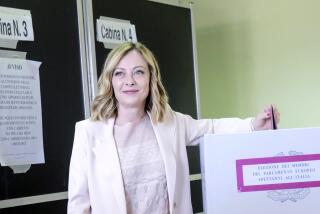Yeltsin Warns Foes on TV Attacks : Russia: Opposition parties had decried his crushing of Parliament. New free speech curbs to be spelled out today.
- Share via
MOSCOW — With Russia’s parliamentary election campaign heating up the airwaves, President Boris N. Yeltsin warned opposition parties Thursday to tone down their televised campaign attacks on him and his proposed constitution.
At the same time, election officials--appointed by the president--drafted free-speech restrictions on campaign advertising to exclude language that incites “ethnic, social and religious animosity” and attacks the “constitutional structure,” Russia’s Interfax news agency reported.
Yeltsin, who is staking his free-market reforms but not his job on the election, has been walking a fine line between building a democracy and ruling as an autocrat since he dissolved the Soviet-era Parliament on Sept. 21 and blasted his armed opponents out of the building with army tanks on Oct. 4.
After outlawing several opposition parties and newspapers, he lifted the ban for all but the most extreme and allowed the Communist Party to make a belated entry into the race for the new Parliament to be elected on Dec. 12.
The president’s latest move came after three opposition parties used free television time to dramatize his use of force to crush the old Parliament as a campaign issue. Yeltsin summoned leaders of the 13 parties in the race to a meeting today to lay down the new restrictions.
“I would like to tell them that they are given time for telling people what their programs are, not for trashing the constitution and the president,” Yeltsin told reporters.
The Central Election Commission announced this week that 490 candidates had qualified to run for the 178-seat Federation Council, the upper house, and 1,567 to run for the 450-seat Duma, or lower house.
Two of the country’s 89 territorial subdivisions, Tatarstan and Chelyabinsk, failed to field enough candidates and must hold their elections 12 weeks later. Chechnya, an estranged southern republic, has refused to take part in any voting.
Politicians generally favoring Yeltsin’s reforms have split into four parties but stand a good chance to win a majority of seats over Communists, right-wing nationalists and centrists who dominated the old Parliament.
*
With time short and winter setting in, all parties are relying heavily on the free hour each has been given on state television to reach voters in 11 time zones. Most are dividing the time into two 30-minute segments and addressing a range of economic and social issues.
But one of the first ads, aired Monday night by the centrist Civic Union, ended with film of a tank shell slamming into the White House Parliament building and crowds fleeing bullets in Moscow streets--images overlaid by a black cross.
Civic Union candidate Oleg Rumyantsev, one of the last holdouts in the building, took a camera around the battered site and showed on television where he and other lawmakers were allegedly beaten by the police. The violence that led to the army assault, an attack by pro-Parliament forces on the state TV broadcast center on Oct. 3, was not mentioned in any of the ads.
The strongest language in any ad came from Stanislav Govorukhin, a renowned filmmaker running for Parliament from the Democratic Party of Russia. Referring to “the barbaric shooting” at the Parliament, he asked, “Who except Bolsheviks is capable of this?” He also accused the government of “encouraging crime, profiting from crime.”
In another ad, Communist leader Gennady Zyuganov said: “They talk about democracy but . . . they fire on Parliament.” His party calls the whole election illegal and is campaigning against Yeltsin’s proposed constitution, which would strengthen presidential powers, if approved by voters on the Dec. 12 ballot.
Such sharp anti-government criticism is rarely heard on Russian Television, which remains largely under Kremlin control, despite other steps toward a multi-party democracy. Yeltsin authorized his spokesman, Vyacheslav Kostikov, to denounce “crude, public insults” and “downright bad language.”
“We hear calls to hate and revenge on those who defended democracy Oct. 3 and 4,” Kostikov said. “The pre-election speeches of several deputies exuded not the spirit of national concord (that) society so needs but the dangerous wind of civil war.”
The ad restrictions, as reported by Interfax, do not specifically prohibit criticism of Yeltsin or his proposed constitution. But by barring expressions that provoke “animosity,” the president’s Information Court of Arbitration was given wide latitude to exercise censorship and to exclude violators from further television campaign appearances.
Vladimir Zhirinovsky, one of the best-known anti-Yeltsin candidates in the race, called the restrictions an attempt to “sterilize” political debate. Communist Party candidate Valentin Kuptsov called them a “flagrant violation of the rights of opposition parties.”
Anti-Yeltsin parties already accuse Russia’s Choice, the dominant pro-government party, of hogging air time on TV news broadcasts, edited by government appointees.
More to Read
Sign up for Essential California
The most important California stories and recommendations in your inbox every morning.
You may occasionally receive promotional content from the Los Angeles Times.













